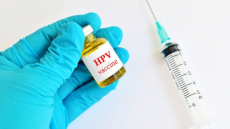

“HPV does not discriminate, it can affect everyone, yet there are still many harmful myths and stigmas surrounding it. This is why a universal vaccination programme is so important, as not only will it normalise this very common virus, and reduce existing inequalities, it will protect many more people from developing cancer and save lives” – says Robert Music.
Since 2008, girls aged 13 have been offered the HPV vaccine for the human papilloma virus to provide protection against cervical cancer. So what is HPV?
Human papillomavirus (HPV) normally cause minor infections with no symptoms and those infected recover spontaneously. However, HPV can persist and cause cancer and genital warts. Cancer develops as a result of the formation of precancerous lesions which increase the risk of developing cervical cancer, cancer of the vulva, vagina, anus, penis, and throat. The majority of cervical cancer comes from HPV strains HPV16 and HPV18. HPV6 and HPV11 are the common cause of genital warts. HPV is a sexually transmitted infection therefore sexual relations are a major risk factor, especially when the first time is of an early age. The HPV vaccine has been successful in preventing the most common infections. The original hopes were that offering the vaccine to all teenage girls before they presumably have had sexual intercourse would provide protection for both girls and boys.
HPV is the most commonly spread sexually transmitted infections and has recently been approved for males in the United Kingdom, like several other countries such as Australia, Canada, New Zealand, South Korea, Hong Kong, Ireland and the United States of America. The NHS are expanding the vaccination programme to 13 year old boys starting year 8 in September. Public Health England estimates that by 2058, 50 years after the vaccine launch, over 100,000 cancers in the UK would have been prevented. “We now have the tools to eradicate most HPV-associated cancers for men and women”- Prof Beate Kampmann.
So it’s a massive celebration and a step in the right direction for public health. Models carried out by the University of Warwick show the likely impact following 50 years of the programme. When the people vaccinated reach the usual age of onset of cancer, they believe 64,138 HPV-related cervical cancers will be prevented, as well as 49,649 other HPV cancers. It will take time to see results, and the majority of cervical cancer cases are the women that were too old to be vaccinated but Dr David Mesher says “there is every indication we will see it in the near future. We will start relatively soon to see an impact in younger women.”
To find out more about the statistical results of the HPV vaccine since 2010, take a look here. You can also watch a video from Jo’s Cervical Cancer Trust! http://vk.ovg.ox.ac.uk/vk/hpv-vaccine-1
Image- https://www.bbc.co.uk/news/health-44494377

0 Comment:
Be the first one to comment on this article.